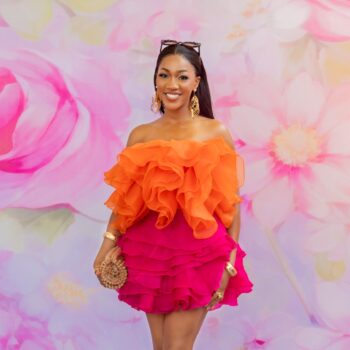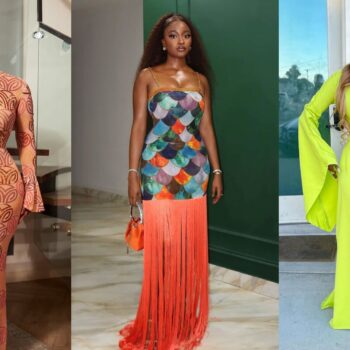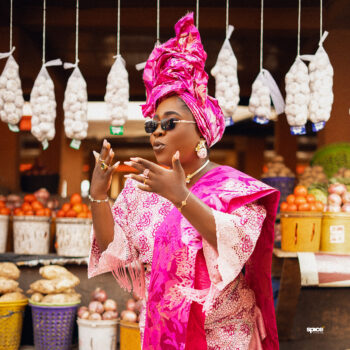Passionate about establishing African fashion at the forefront of daily living across the globe, fashion storyteller and global fashion consultant, Tejumola Maurice-Diya, launched 30 Days of Àdìrẹ to highlight various possibilities of the epic African textile art — Àdìrẹ.
View this post on Instagram
Popular Àdìrẹ is of Yoruba origin. The textile art is designed with wax-resist dyeing techniques. Àdìrẹ literally translates as “tied to dye” from “Àdì” meaning “to tie” and “arẹ” meaning “to dye”. It is very common among the Ẹ̀gbá people of Ogun State and available throughout Yorubaland.
Àdìrẹ has deep roots in Nigerian cities like Abeokuta, Osogbo, Ile-Ife, and Ibadan. Its intricate patterns and vibrant colours have captured local and international market attention, making it a sought-after fabric for fashion and home decor.
View this post on Instagram
Tejumola’s #30DaysOfAdire is bringing more awareness to this age-old fabric. Her commitment to advancing African fashion is evident in her pioneering efforts. Her advocacy for locally manufactured fabrics encourages designers to embrace innovative native designs and foster sustainable fashion ecosystems.
She explores 30 practical, everyday Àdìrẹ outfits from made-in-Africa brands that can be worn today. Hopefully, you will like a look or two (2) and incorporate more Àdìrẹ into your wardrobe.
DAY 1
View this post on Instagram
Àdìrẹ vest from @dye_lab
Àdìrẹ is such a rich, beautiful textile loaded with history and meaning; more importantly, it is versatile, simple, and I would argue it can fit into almost anyone’s wardrobe!
— Tejumola Maurice-Diya
DAY 2
View this post on Instagram
Unquestionably, African designers are highly creative, brutally innovative, and endlessly driven; more recently, we have seen the Àdìrẹ fabric being used in a lot of unique and refreshing ways. I mean, short of using it for a church wedding dress, (and trust me, that’s coming) these designers are doing unprecedented things with Àdìrẹ.
— Tejumola MD
DAY 3
View this post on Instagram
Raffia Àdìrẹ blouse from @eki_kere
This 30 Days of Àdìrẹ campaign showcases some of African fashion designers’ wins, and “inspires fashion enthusiasts on some creative ways to style Àdìrẹ, in ways they may not have previously considered; incorporating it into everyday wardrobes and not skipping a beat! If anything, it should add to your ‘je ne sais quoi’!”
DAY 4
View this post on Instagram
Outfit from @bimmms24
Candle wax or bees wax are often used as resistance for dyes. The best part about using wax is that you can create all sorts of intricate patterns. Certain Àdìrẹ textiles have meaningful patterns intended to convey messages.
DAY 5
View this post on Instagram
There are three (3) main types of Àdìrẹ—Àdìrẹ Ẹlẹ́kọ (hand-painted), Àdìrẹ Òníkó (tie-dyed), and Àdìrẹ Alábẹ́rẹ́ (stitched).
DAY 6
View this post on Instagram
- Àdìrẹ Ẹlẹ́kọ (hand-painted) involves painting designs onto the fabric using cassava starch paste, which resists the dye
- Àdìrẹ Òníkó (tie-dyed) involves tying sections of the fabric with raffia or cotton thread before dyeing
- Àdìrẹ Alábẹ́rẹ́ (stitched) involves stitching patterns onto the fabric with thread, which is removed after dyeing to reveal the design.
DAY 7
View this post on Instagram
Through her work, Tejumola seeks to shape the narrative surrounding African fashion, showcasing its rich heritage, versatility, and innovative potential.
By promoting sustainable practices and supporting local artisans, she fosters a more inclusive and equitable fashion industry that not only celebrates African culture but also, contributes to economic growth and social empowerment.
DAY 8
View this post on Instagram
Àdìrẹ boubou from @ituenbasi
DAY 9
View this post on Instagram
Deconstructed Àdìrẹ Agbada from @ituenbasi
Àdìrẹ has been recognized by UNESCO as an Intangible Cultural Heritage, emphasizing its importance to cultural identity.
DAY 10
View this post on Instagram
DIY Àdìrẹ kits are now available on the market allowing people to create custom tie-dyed fabrics at home. Would you consider creating your own Àdìrẹ?
DAY 11
View this post on Instagram
Àdìrẹ set from @dye_lab
Wondering what’s the difference between Àdìrẹ and Kampala?
Àdìrẹ uses cotton fabric as the base material, while Kampala utilises the inner bark of specific fig trees.
Newer Àdìrẹ designs incorporate bright colours and abstract patterns, appealing to modern taste.
DAY 12
View this post on Instagram
Successful Àdìrẹ production requires various favourable factors to get the right patterns such as climate, manpower, and high-quality textiles.
DAY 13
Innovation and modern technology are now being used to create Àdìrẹ lookalike prints. This dress by @yesidelaguda is an example.
View this post on Instagram
DAY 14
View this post on Instagram
Àdìrẹ ensemble from @ejiroamostafiri
Advanced technology has increased productivity across all fields of work. Thanks to technology, we now have access to Àdìrẹ prints beyond textiles. The prints can translate into other expressive art such as digital Àdìrẹ art used in the production of digital Àdìrẹ papers.
DAY 15
View this post on Instagram
Àdìrẹ bubble dress from @yesidelaguda
DAY 16
View this post on Instagram
Pink Àdìrẹ set from @emmykasbit
What great times we are living in! Where we can experience Àdìrẹ in denim…
DAY 17
View this post on Instagram
Àdìrẹ denim set from @ruksalamode
DAY 18
View this post on Instagram
Àdìrẹ piece from @moyeafrica
The first sets of Àdìrẹ produced were limited to deeply contrasting colours, monochromes consisting primarily of indigo and white.
While Indigo is a rich and playful colour, I’m so glad we now get to explore many vibrant colours and amazing prints…
DAY 19
View this post on Instagram
Àdìrẹ 2-piece from @ara.lagos_
DAY 20
View this post on Instagram
Àdìrẹ dress from @chenche_lagos
DAY 21
View this post on Instagram
Àdìrẹ outfit from @christiebrowngh
DAY 22
View this post on Instagram
Àdìrẹ skirt from @eki_kere
DAY 23
View this post on Instagram
DAY 24
View this post on Instagram
Àdìrẹ ensemble with sequin & interesting yarn details from @the_ladymaker
DAY 25
View this post on Instagram
Àdìrẹ handbag from @eki_kere
The campaign hopes that every person—regardless of age (from Gen Alphas to Baby Boomers), location (all of the designers featured ship worldwide), or even cultural norms (Àdìrẹ pairs well with almost anything)—will find a point of connection with this ageless fabric and consciously make an effort to broaden their fashion horizon with it!
I think it is a great opportunity for global brands to see opportunities for partnerships with African designers and manufacturers.
And needless to say, I’m here for it, to provide support all the way. As always, I’m available to “bridge the gap” – supporting broader conversation around retail partnerships, sustainable manufacturing, and responsible sourcing and design inspiration!
See more at TejumolaMD.com or @tejumolamd




